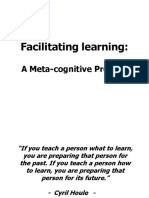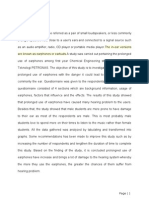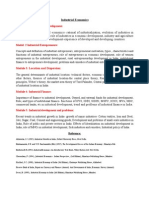Course: AP Psychology Grade Level: 11-12 Unit Title/A Study in Developmental Length of Unit: 3 Weeks Unit Summary
Course: AP Psychology Grade Level: 11-12 Unit Title/A Study in Developmental Length of Unit: 3 Weeks Unit Summary
Uploaded by
RossCopyright:
Available Formats
Course: AP Psychology Grade Level: 11-12 Unit Title/A Study in Developmental Length of Unit: 3 Weeks Unit Summary
Course: AP Psychology Grade Level: 11-12 Unit Title/A Study in Developmental Length of Unit: 3 Weeks Unit Summary
Uploaded by
RossOriginal Title
Copyright
Available Formats
Share this document
Did you find this document useful?
Is this content inappropriate?
Copyright:
Available Formats
Course: AP Psychology Grade Level: 11-12 Unit Title/A Study in Developmental Length of Unit: 3 Weeks Unit Summary
Course: AP Psychology Grade Level: 11-12 Unit Title/A Study in Developmental Length of Unit: 3 Weeks Unit Summary
Uploaded by
RossCopyright:
Available Formats
Course: AP Psychology Grade Level: 11-12
Unit Title/A Study In Developmental Length of Unit: 3 weeks
Unit Summary:
Stage 1- Desired Results
STANDARDS Transfer
Priority: Students will independently use their learning to . . .
Describe theories of social development Understand how people change over time
Describe the development of attachment
and appropriate socialization Meaning
Supporting: ENDURING UNDERSTANDINGS ESSENTIAL QUESTIONS
Describe the early physical development Students will understand that… Students will continue to consider . . .
(up to maturation) A variety of factors affect a person’s Overarching: Why do people change?
Describe prenatal development and behavior but these factors also change Topical: Which impacts us more: Nature or
physical development in childhood
Describe how gender influences
as one ages and their nurture?
socialization motivations/priorities shift.
Describe adolescent development
Describe adulthood and moral Acquisition
development Students will know… Students will be skilled at…
Human Development, Longitudinal Study, Cross- Describe theories of social development
SEctional Study, Cross-Sequential Study, Erik Describe the early physical development (up to
Erikson, Trust vs. Mistrust, Autonomy vs. maturation)
Shame/Doubt, Initiative vs. Guilt, Industry vs. Describe prenatal development and physical
Inferiority, Indentity vs. Role Confusion, Intimacy development in childhood
vs. Isolation, Generativity vs. Stagnation, Ego Describe the development of attachment and appropriate
Integrity vs. Despair socialization
Prenatal Development, Germinal Period, Describe how gender influences socialization
Placenta, Embryonic Period, Fetal Period, Fetus, Describe adolescent development
Critical Periods, Birth Defects, Teratogen, Stress, Describe adulthood and moral development
Alcohol, Fetal Alcohol Syndrome (FAS),
Smoking/Nicotine, Marijuana, Prescription/Illegal
Drugs, Reflexes, Nenates, Maturation, Blooming,
Developmental Norms, Six Motor Milestones,
Infantile Amnesia
Stanger Anxiety, Attachment Bond, John Bowlby,
Attachment Theory, Konrad Lorenz, Imprinting,
Sensitive Period, Harry Harlow, Contact Comfort,
Mary Ainsworth, Strange Situation Experiments,
Secure Attachment, Avoidant (Insecure)
Attachment, Anxious-Ambivalent Attachment,
Disorganized Attachemnt, Temperament,
Authoritarian, Permissive, Authoritative,
Deprivation of Attachment, Abuse-Breeds-Abuse
Phenomenon
Kohlberg, Preconventional Morality, Conventional
Morality, Postconventional Morality, carol Gilligan
Cognitive Development, Jean Piaget, Schema,
Assimilation, Accomodation, Sensorimotor Stage,
Object Permanence, Preoperational Stage,
egocentrism, Theory of Mind, Conservation,
Centration, Animism, Concrete Operational
Stage, Decentraion, Formal Operational Stage,
Lev Vygotsky, Zone of Proximal Development
(ZPD), Scaffolding
Sex, Male Testosterone, Estrogen, Gender,
Gender Identity, Human Sexuality, Sexual
Orientation, Gender Roles, Gender Socialization,
Social Learning Theory, Gender Schema Theory
Adolescence, Puberty, Primary Sex
Characteristic, Secondary Sex Characteristic,
Early-Maturing Boys, Late-Maturing Boys, Early-
Maturing Girls, Frontal Lobes, Synaptic Pruning,
Adolescent Egocentrism, Personal Fable,
Imaginary Audience, Identity Formation, Social
Identity, Identity Diffusion, Identity Foreclosure,
Identity Moratorium, Identity Achievement,
Romantic Relationship, Parent Relationships,
Peer Influence
Adulthood, Emerging Adulthood, Physical
Development of Early Adulthood, Menopause,
Dementia, Alzheimer's Disease, Midlife Crisis,
Social Clock, Moral Development, Larence
Stage 2- Evidence
Evaluation Criteria Assessment Evidence
PERFORMANCE TASK(S):
Story of my life
Piaget Toy presentation
OTHER EVIDENCE:
Unit exam
Quizes (x5)
Stage 3- Learning Plan
Acquisition, meaning-making or Objective Instructional plan
transfer?
Acquisition Identify the contributions of major researchers in Introduce Erik Erikson and Abraham
developmental psychology in the area of social
development in childhood.
Maslow’s theories of development
Acquisition Explain the process of conception and gestation,
including factors that influence successful pre-natal
development.
Acquisition Describe the influence of temperament and other social
factors on attachment and appropriate socialization.
Discuss the interaction of nature and nurture (including
cultural variations), specifically social development, in
the determination of behavior.
Acquisition Explain how parenting styles influence development
Acquisition/Meaning-making Explain the maturation of cognitive abilities (Piaget’s
stages, Information process).
Transfer Toy presentation
Acquisition Describe how sex and gender influence socialization and
other aspects of development.
Discuss maturational challenges in adolescence,
including related family conflicts.
Acquisition Characterize the development of decisions related to
intimacy as people mature.
Predict the physical and cognitive changes that emerge
through the lifespan, including steps that can be taken to
maximize function.
Acquisition/Meaning-making Identify the contributions of major researchers in the
area of moral development.
Meaning-making Seminar discussion
Acquisition Review
Acquisition Test
You might also like
- Psychological, Anthropological, and Sociological Foundations of EducationDocument13 pagesPsychological, Anthropological, and Sociological Foundations of EducationEdison Dela Cruz Jr.100% (3)
- 8 Chat GPT Prompts Into 625 Content IdeasDocument15 pages8 Chat GPT Prompts Into 625 Content IdeasNhan su Sach100% (2)
- Human Development Meaning Concepts, and ApproachesDocument9 pagesHuman Development Meaning Concepts, and ApproachesJomelyd Alcantara100% (1)
- Oromo Sept 11Document101 pagesOromo Sept 11totoba2648No ratings yet
- Being With BabiesDocument3 pagesBeing With Babiesapi-264474189No ratings yet
- AP Psych UbD Developmental (No Logo)Document5 pagesAP Psych UbD Developmental (No Logo)RossNo ratings yet
- Chapter 1. Development Autosaved 1Document23 pagesChapter 1. Development Autosaved 1Judyangaangan03No ratings yet
- Syllabus in Advanced Developmental PsychologyDocument6 pagesSyllabus in Advanced Developmental Psychologyava1234567890No ratings yet
- Life Span Development Week 7Document8 pagesLife Span Development Week 7kpelotNo ratings yet
- Understand Human Development and The Impact On Mental, Physical, Behavioural Cognitive Health Conditions.Document18 pagesUnderstand Human Development and The Impact On Mental, Physical, Behavioural Cognitive Health Conditions.sweetjiteNo ratings yet
- Lesson 1: The Study of Human DevelopmentDocument14 pagesLesson 1: The Study of Human DevelopmentNicole LunaNo ratings yet
- Khimelden Aruzhan CS2001 SIS2Document16 pagesKhimelden Aruzhan CS2001 SIS2Aruzhan KhimeldenNo ratings yet
- Theories of Human DevelopmentDocument8 pagesTheories of Human DevelopmentJessel Mae Dacuno100% (1)
- Modue 2 4 Prof Ed 1Document31 pagesModue 2 4 Prof Ed 1torrezcygenNo ratings yet
- Dev Psy NotesDocument7 pagesDev Psy NotesescasinasmonicaNo ratings yet
- Ego Identity Test (Basic Concepts)Document15 pagesEgo Identity Test (Basic Concepts)Nawazish AnsariNo ratings yet
- Lesson 1: Introduction To Personal DevelopmentDocument7 pagesLesson 1: Introduction To Personal DevelopmentDenise MNo ratings yet
- Psychology CHP 2aDocument14 pagesPsychology CHP 2aJohnson MurrayNo ratings yet
- Theory and Research in Developmental PsychologyDocument26 pagesTheory and Research in Developmental PsychologycmescondeNo ratings yet
- Adolescence Psy Feb 2024Document112 pagesAdolescence Psy Feb 2024derricksydneyodhiamboNo ratings yet
- Divine Word College of Laoag: Angelito B. Corpuz, MAEDDocument73 pagesDivine Word College of Laoag: Angelito B. Corpuz, MAEDANGELITO CORPUZNo ratings yet
- Intro To Human DevelopmentDocument10 pagesIntro To Human DevelopmentAllison MaañoNo ratings yet
- Developmental Psychology Stages of The DevelopmentDocument3 pagesDevelopmental Psychology Stages of The DevelopmentCastillo Rea Jane C.No ratings yet
- Personality DevelopmentDocument23 pagesPersonality DevelopmentRenz Michael Tiamson LalicNo ratings yet
- Child PsychologyDocument9 pagesChild Psychologynayyabkhan192No ratings yet
- Development CLASSDocument33 pagesDevelopment CLASSJulie JančíNo ratings yet
- DevPsych Theories - ReportDocument62 pagesDevPsych Theories - ReportApple DitablanNo ratings yet
- Week 13 MCHNDocument9 pagesWeek 13 MCHNCyrille Kibbz DonatoNo ratings yet
- Personal DevelopmentDocument7 pagesPersonal DevelopmentLey MibayursaydNo ratings yet
- Module 1 Prof EdDocument6 pagesModule 1 Prof EdGarcia Khristine Monique BadongNo ratings yet
- Human Development: Meaning, Concepts and ApproachesDocument6 pagesHuman Development: Meaning, Concepts and ApproachesVien MakNo ratings yet
- Developmental TheoriesDocument21 pagesDevelopmental TheoriesMary Rose PrudenteNo ratings yet
- Reviewer DevpsyDocument10 pagesReviewer DevpsyRICA MAE PADERESNo ratings yet
- Chapter IDocument6 pagesChapter IMelchor SambranoNo ratings yet
- Lesson 1 Human Development (Atg 1)Document22 pagesLesson 1 Human Development (Atg 1)Jevi Jeunesse BaliarNo ratings yet
- Human DevelopmentDocument3 pagesHuman DevelopmentLouise Alenah LabragueNo ratings yet
- علمDocument5 pagesعلمnafihtaherNo ratings yet
- Unit 2 Basic Concepts and Issues On Human Development - Brenda B. Corpuz, PHDDocument7 pagesUnit 2 Basic Concepts and Issues On Human Development - Brenda B. Corpuz, PHDAngge MacaraegNo ratings yet
- Growth and Devlopment CNCPT Let 2008Document8 pagesGrowth and Devlopment CNCPT Let 2008richmarkconag1No ratings yet
- Non-Nursing Theories A. Systems TheoryDocument11 pagesNon-Nursing Theories A. Systems Theoryethics wixNo ratings yet
- Human Behavior and Victimology Chapter 1 6Document62 pagesHuman Behavior and Victimology Chapter 1 6JUNRIL BUTAL0% (1)
- Dev Psych Chapter 1 NotesDocument5 pagesDev Psych Chapter 1 NotesJan Dela RosaNo ratings yet
- Discovering the Life Span, 5th edition Robert S. Feldman all chapter instant downloadDocument62 pagesDiscovering the Life Span, 5th edition Robert S. Feldman all chapter instant downloadlokvensurend100% (1)
- Matrix On The Theories On Human Development 2 PDFDocument12 pagesMatrix On The Theories On Human Development 2 PDFCarlo AngcanaNo ratings yet
- Psychological AgeDocument15 pagesPsychological AgeannavalensaNo ratings yet
- All Notes. Dev PsychDocument25 pagesAll Notes. Dev PsychPulara GunerathnaNo ratings yet
- Developmental PsychDocument3 pagesDevelopmental PsychDOMINIQUE CALIMONNo ratings yet
- Developmental Psychology ConpletedDocument13 pagesDevelopmental Psychology ConpletedMUHAMMAD YASEEN YSNo ratings yet
- Unit 1 - SlidesDocument71 pagesUnit 1 - Slideslittl3.temtation20No ratings yet
- Prof EducDocument27 pagesProf Educchristine manaloNo ratings yet
- Reviewer Ni MonayDocument20 pagesReviewer Ni MonayDave Matthew LibiranNo ratings yet
- IC103 - General Psychology: Psychology of Human Growth and DevelopmentDocument15 pagesIC103 - General Psychology: Psychology of Human Growth and DevelopmentKimberly PeolioNo ratings yet
- Chapter 24_ Psychosocial Development in Early Adulthood – Human Behavior and the Social Environment IDocument49 pagesChapter 24_ Psychosocial Development in Early Adulthood – Human Behavior and the Social Environment IsyafanarpNo ratings yet
- Ece 15 - Module 1 - LacoDocument6 pagesEce 15 - Module 1 - LacoJELLAMIE LACONo ratings yet
- Chapter 1 Introduction To Lifespan DevelopmentDocument31 pagesChapter 1 Introduction To Lifespan Developmentzyati.2386No ratings yet
- Discovering The Life Span, 5th Edition Robert S. Feldman All Chapter Instant DownloadDocument53 pagesDiscovering The Life Span, 5th Edition Robert S. Feldman All Chapter Instant DownloadbanisakatetaNo ratings yet
- Chapter 2. Metatheories Students GuideDocument4 pagesChapter 2. Metatheories Students GuideCRISLYN CUTAMORANo ratings yet
- TC 001 Module 1 Human Development Meaning Concepts and Approaches 1Document8 pagesTC 001 Module 1 Human Development Meaning Concepts and Approaches 1Carl Bryan HernaezNo ratings yet
- Facilitating LearningDocument337 pagesFacilitating LearningDen Seguenza100% (1)
- CM 4 - Developing The Whole PersonDocument12 pagesCM 4 - Developing The Whole PersonKashmyr Faye CastroNo ratings yet
- Developmental Psychology for Beginners How to Easily Understand the Stages of Development From Infant to Adult and Apply the Insights Specifically to Your Life or Child RearingFrom EverandDevelopmental Psychology for Beginners How to Easily Understand the Stages of Development From Infant to Adult and Apply the Insights Specifically to Your Life or Child RearingNo ratings yet
- Psicología del desarrollo para principiantes Cómo comprender fácilmente las etapas del desarrollo desde el lactante hasta el adulto y aplicar las conclusiones de forma específicaFrom EverandPsicología del desarrollo para principiantes Cómo comprender fácilmente las etapas del desarrollo desde el lactante hasta el adulto y aplicar las conclusiones de forma específicaNo ratings yet
- Mahindra Report: Analysis of Mahindra & Mahindra ScorpioDocument58 pagesMahindra Report: Analysis of Mahindra & Mahindra ScorpioAnand Singh TomarNo ratings yet
- Orientation in PIMAMDocument63 pagesOrientation in PIMAMEunicee ElardoNo ratings yet
- Read The Sentences To Decide Whether The Verbs Should Be Singular or Plural. Then Click The Dropdown Menu To See The AnswerDocument1 pageRead The Sentences To Decide Whether The Verbs Should Be Singular or Plural. Then Click The Dropdown Menu To See The AnswerCarlynArgentinaPaitanCarduzaNo ratings yet
- Tvet Instruction PDFDocument123 pagesTvet Instruction PDFAmin ZakariaNo ratings yet
- Pt. Indraloka: Daftar Harga Pelayanan Kalibrasi Tahun 2019Document4 pagesPt. Indraloka: Daftar Harga Pelayanan Kalibrasi Tahun 2019Benedictus hutomo mantoNo ratings yet
- $RSCIN4JDocument29 pages$RSCIN4JFikri HamzahNo ratings yet
- Parts Catalogue of Foton: (TC2A504-034K)Document132 pagesParts Catalogue of Foton: (TC2A504-034K)МаксимNo ratings yet
- Shift 1. AC Apr. NEWDocument1 pageShift 1. AC Apr. NEWKesavapillai GanesanNo ratings yet
- Saint James Infirmary BluesDocument3 pagesSaint James Infirmary BluesGuyMcgowan100% (1)
- Ôn Tập Unit 4 A. Phonetics and Speaking: Chọn từ có phần gạch chân được phát âm khácDocument8 pagesÔn Tập Unit 4 A. Phonetics and Speaking: Chọn từ có phần gạch chân được phát âm khácPhương Anh NguyễnNo ratings yet
- Topic 6. Randomized Complete Block Design (RCBD)Document20 pagesTopic 6. Randomized Complete Block Design (RCBD)Teflon SlimNo ratings yet
- MOC - A Brief Introduction To The ModuleDocument2 pagesMOC - A Brief Introduction To The ModuleNguyễn Hải LongNo ratings yet
- Intellectual Property in The Videogame IndustryDocument32 pagesIntellectual Property in The Videogame IndustryRahul RoshanNo ratings yet
- DRR11 12 Ia B 5Document3 pagesDRR11 12 Ia B 5ben leeNo ratings yet
- (WN) ReZero - Volume 37 (Dark)Document385 pages(WN) ReZero - Volume 37 (Dark)Little HiroNo ratings yet
- M.Tech RFDocument33 pagesM.Tech RFSree288No ratings yet
- BEST PAPER STEM HS Malabar Spinach Basella Alba L. Leaves Extract As Acoustic Gel AlternativeDocument74 pagesBEST PAPER STEM HS Malabar Spinach Basella Alba L. Leaves Extract As Acoustic Gel AlternativeraknamocNo ratings yet
- Unlock Patni CDocument159 pagesUnlock Patni CadityaNo ratings yet
- Instantly Spreading BasicDocument15 pagesInstantly Spreading BasicNarsingh YadavNo ratings yet
- Catalogo Stampanti Nippon PrimexDocument57 pagesCatalogo Stampanti Nippon Primex0d serviceNo ratings yet
- 1996 Holman Till Jesus ComesDocument23 pages1996 Holman Till Jesus Comesmount2011No ratings yet
- Just A Theory: 7 Misused Science Words Scientific American Pg2Document5 pagesJust A Theory: 7 Misused Science Words Scientific American Pg2Kathleen Clare LeGrasNo ratings yet
- Internship ReportDocument7 pagesInternship ReportDev Tiwari100% (2)
- Unit1.Introduction to communicationDocument13 pagesUnit1.Introduction to communicationjoshiajinkya0075No ratings yet
- Final Sylla 1Document1 pageFinal Sylla 1brundaban_santaNo ratings yet
- The Gamelan Music of Indonesia SummaryDocument5 pagesThe Gamelan Music of Indonesia SummaryEdward O' GormanNo ratings yet
























































































